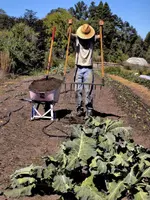DeepseekerADS
Gold Member
- Joined
- Mar 3, 2013
- Messages
- 14,880
- Reaction score
- 21,742
- Golden Thread
- 0
- Location
- SW, VA - Bull Mountain
- Detector(s) used
- CTX, Excal II, EQ800, Fisher 1260X, Tesoro Royal Sabre, Tejon, Garrett ADSIII, Carrot, Stealth 920iX, Keene A52
- Primary Interest:
- Other
- #41
Thread Owner
Making Bordeaux Spray = Fungicide for grapes and fruit trees
I posted this video here for future reference.
I posted this video here for future reference.





